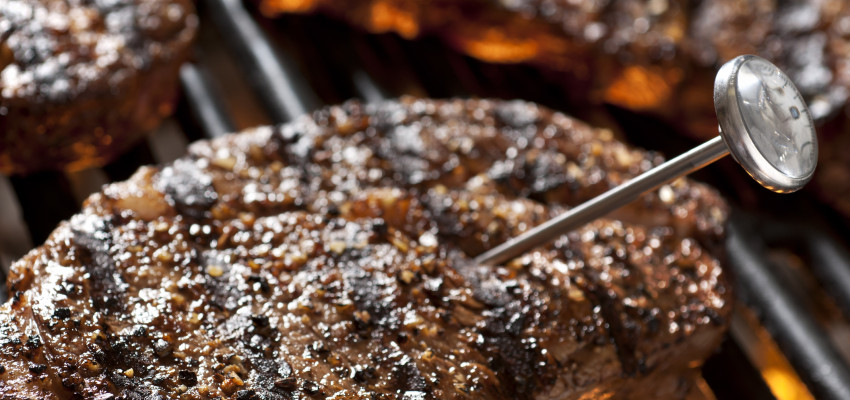By Cara Harbstreet on June 20, 2017
Food safety and summer BBQs

Summer grilling season is well underway. With plenty of warm (OK, hot and humid) days ahead of us, it’s more important than ever to get a good handle on food safety to avoid inviting food-borne illnesses to the party.
The most recent stats from the Centers for Disease Control and Prevention (CDC) reveal that more than 48 million Americans were sickened by food-borne illness in 2011.This was the first comprehensive look at illness caused specifically by foods. Of that number,128,000 people required hospitalization for treatment and 3,000 people died. It’s a serious matter, but one that can easily be prevented with a few simple steps.
Here’s a rundown of the most common culprits for food-safety pitfalls and how to avoid them:
1. Raw meat of any kind
It’s not the finished product that’s an issue - in fact, cooking meat, poultry and seafood to the minimum internal temperature is the surest way to prevent a food safety disaster when eating these foods (here’s a resource for those temperatures). Use a meat thermometer to ensure your grilled meats hit the mark. Not sure how? Check out what tips the Food Safety and Inspection Service has about them.
The improper handling of raw or undercooked meats is a common mistake. Practice good food safety measures before, during and after tossing everything on the grill. That includes swapping or washing your cutting boards and knives, disinfecting all surfaces before and after handling raw meats and taking care to not allow drippings to land on other foods or surfaces.
Cross contamination is a serious problem with serious consequences - this is why we sometimes hear reports of only a few individuals falling ill while others who eat the cooked food remain healthy. It has more to do with what happens BEFORE, not after cooking.
2. Any salads other than the leafy variety
Potato salad, pasta salad, egg salad, you name it. If it’s got a creamy egg- or mayo-based dressing and the word “salad” in its name you’ll want to take extra care to keep it chilled. Bacteria thrives in temperatures above 40 degrees. A chilled salad sitting out for more than a few minutes on a hot day quickly becomes a breeding ground for bacteria like salmonella, E. coli, norovirus, shigella and more.
Keep these prepared dishes in a cooler or better yet, the fridge inside if you have that option. If they do need to come out, set them on ice and keep them covered.
3. Actually, the leafy varieties, too
Raw produce can still be at risk for contamination from other foods, poor handling or naturally occurring bacteria. Be sure to thoroughly wash and dry all food that will be consumed raw. This even applies to things like watermelons, since the knife used to cut the rind still passes through the flesh and can introduce bacteria to the part we eat.
The same rules for our salads also apply to fresh fruit or fruit salads and desserts. Keep them chilled as much as possible to limit the amount of time they’re exposed to higher temperatures that can harbor harmful bacteria. Keeping them indoors or covered also minimizes the risk of cross contamination as other foods are passed over them or serving utensils are swapped.
4. Anything that can be a carrier for bacteria
If nothing else, wash your hands. This routine habit alone can reduce our risk of food poisoning. Remember to keep hot foods hot and cold foods cold - and when in doubt, throw it out. This dietitian hates food waste just as much (likely more) than the next person but I hate to see preventable food poisoning, too.
In addition to a meat thermometer, here are a few other items that can help you avoid cross contamination with bacteria that can lead to food poisoning:
- Multiple coolers: One for beverages (always important), plus one for raw meat/poultry/seafood and one for other items that need to stay cold.
- A few shallow pans or large bowls you can fill with ice to keep cold items cold. Replace the ice often and be careful not to slosh water from the melted ice into your serving dishes.
- Plenty of utensils and cutting boards. If you think you have enough of each, add two more. It never fails that something gets dropped or accidentally comes in contact with raw or undercooked meat. You can never be too careful and when in doubt, give it a full wash before using it again.
- Tupperware, plates and foil for leftovers. Once everyone’s served their plate, don’t hesitate to pack leftovers and move them inside to the fridge or into an iced-down cooler. If you’re at home, you likely have everything you need, but if you’re not, be sure to bring these items with you.


